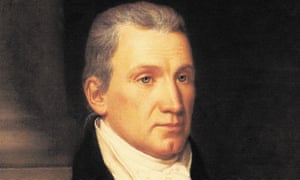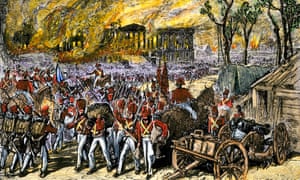A life of the fifth president makes interesting reading, not least for his warnings about foreign influence in the White House

Photograph: Buyenlarge/Getty Images
Why read a biography of James Monroe, the fifth American president?
Not, for British readers, merely because Tim McGrath begins with the sacking of Washington in 1814, which led to Monroe’s appointment as secretary of war and eventual election as president.
Nor simply because Monroe had a fascinating career, crossing the Delaware with Washington on Christmas Day 1776 and being seriously wounded at Trenton the next day; serving as governor and senator of Virginia; twice being minister to France and once to Britain; being elected president twice; and dying on 4 July 1831, the nation’s 55th birthday.
This last of the founding generation to be president bridged the Revolution – Jefferson was his teacher, friend and neighbor, James Madison a lifelong friend and sometime rival – with the first sectional conflicts of the Antebellum era. This is more than an accident of dates: once the country’s independence was truly secure following the War of 1812, it could look to the new territories of “Louisiana” for expansion and an emerging presence on the world stage.
We see here the twilight of a unique generation. As the Virginia lawyer Francis Gilmer commented, “Monticello is most interesting on a summer night … Jefferson’s mind is the most capacious, Madison’s the most rapid, Monroe’s the most sure. One has most learning, another most brilliancy, a third [the] most judgment. Mr Jefferson surpasses in the management of bodies of men & Monroe of individuals.”
McGrath writes of the “calling of honorable public service that echoes throughout Monroe’s life”. He ran against his friend Madison for Congress to reaffirm a principle, “a heartfelt belief that a new American government was not American without safeguarding the rights of its citizens. Politicians rarely think this way now or in 1788, but Monroe did.”
Aspects of Monroe’s presidency are surprisingly modern. He began by following Washington’s example of making a tour of the country, garnering political capital for the changes in national policy he sought, seeking (and mostly succeeding, for a time) to unite Republicans and Federalists in a common cause. His first term was known, not without reason, as the “Era of Good Feelings”.
Monroe wanted Congress to fund roads and canals as “internal improvements” to aid economic growth. It did not. In the aftermath of the Panic of 1819, he proposed relief for land purchasers, as “the purchases were made when the price of every article had risen to its greatest height, and that the installments are due at a period of great depression.” He championed defence, military preparedness and even the beginnings of international relief, requesting $50,000 from Congress to send to Caracas after an earthquake.
There are more direct parallels with our own day. This, from Monroe’s remarks against ratification of the constitution in 1788, could have served as a frontispiece for the Mueller Report:
If [the president] and his counselors can escape punishment with so much felicity, what a delightful prospect must it be to a foreign nation, which is desirous of gaining territorial or commercial advantages over us to practice on them? The certainty of success would be equal to the impunity.
As McGrath comments, “The thought that a foreign power could hold such sway within the president’s own circle haunted Monroe … ‘Foreign nations, by their intrigues, have great influence in each state, in the election of the president.’”
Monroe opposed forcible removal of Native Americans as “revolting to humanity, and to the honor of the nation”, but his policy of voluntary removal combined with efforts at assimilation through education and agriculture was doomed when Andrew Jackson came to power.
Divisions over slavery were most pronounced in the controversy in 1820 about the admission to the union of Missouri and Maine, which resulted in the Missouri Compromise. Monroe embodied the contradictions of slavery, seeing its dangers and opposing it in principle even as he was himself a slaveholder. As governor of Virginia he recommended some clemency after a slave revolt, but he concluded that to end slavery was too great a step, which he could not accomplish alone.
As McGrath writes, “Perhaps it is caution, not conscience, that makes cowards of us all.”

Monroe’s deliberative decision-making led to many wise actions, particularly in foreign policy. In partnership with his secretary of state, John Quincy Adams, he was able to forge a pact with Britain against the slave trade, resolve a boundary issue with Russia, negotiate a treaty with Spain that put the United States on the Pacific coast, and begin recognizing the Latin American republics that had revolted from Spanish rule.
Monroe’s famous doctrine, designed to forestall any attempt by European powers to re-establish colonies in South America, declared the era of colonization in the western hemisphere over and declared that an attack on the new republics would be considered “as an attack on ourselves”.
It was armed neutrality and protection rather than collective defence, but it has endured for two centuries as a bedrock principle of US foreign policy. The doctrine was fiercely opposed by, among others, Metternich, who called it “no less dangerous” than the American Revolution. It was – to monarchies, exactly as Monroe intended.
Like Harry Truman, another quintessentially American president beset by money and farming troubles throughout his life, Monroe was not immune from the temptations of partisanship but sought to rise above it and to serve honorably, doing the right thing for the country by his lights. As with Truman, a surprising amount of his work endures.
Before Monroe left for France to negotiate the Louisiana Purchase, Jefferson and Madison gave him a dinner. After a hearty meal and “some tolerable Singing”, Monroe made a toast to “the union of the United States – may political discussion only tend to cement it”.
America could use another Era of Good Feelings.



